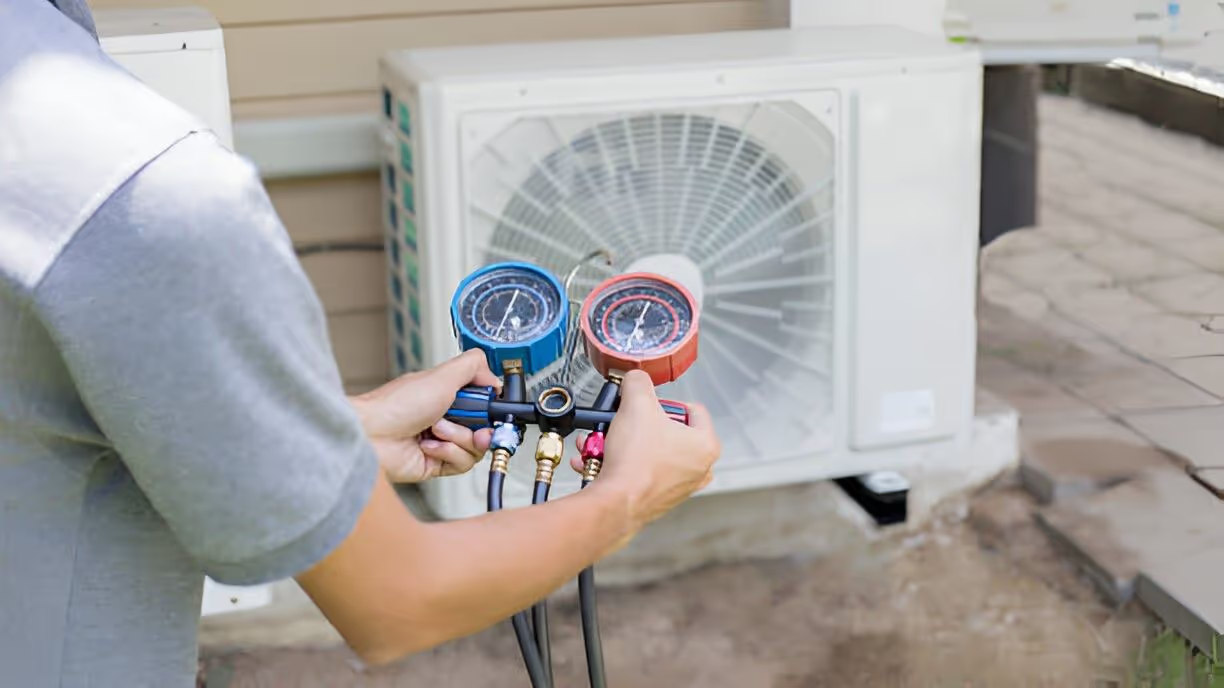AC Tune-Up in St. Petersburg, FL


What a Typical AC Tune-Up Includes
A complete tune-up is a methodical inspection and service package designed to catch small issues before they become major repairs. Typical tasks include:
- Electrical inspection: Test capacitors, contactors, breakers, fuses, and wiring for wear, correct voltages, and safe operation. Heat and salt air in coastal St. Petersburg often accelerate electrical component wear.
- Lubrication of moving parts: Oil bearings and motors where applicable to reduce friction and prevent premature motor failure.
- Cleaning coils and condensate drains: Remove dirt, pollen, and salt residue from evaporator and condenser coils to restore heat transfer. Clear and flush condensate drains to prevent clogging and water damage caused by algae growth in humid climates.
- Checking refrigerant levels and pressures: Measure system pressures and calculate superheat/subcooling to ensure correct refrigerant charge. Low charge in coastal homes often indicates a leak and reduced cooling capacity.
- Thermostat calibration: Verify thermostat accuracy and settings so the system cycles properly and maintains desired comfort levels.
- Airflow and duct checks: Inspect blower performance, filter condition, and accessible ductwork for obstructions, leaks, or collapsed sections that reduce airflow.
- Safety and control checks: Verify safety switches, float switches, and startup/shutdown sequences function correctly.
- Detailed reporting of recommended repairs: Provide a prioritized list of repairs and replacements that improve efficiency and reduce risk of failure.
Common AC Tune-Up Issues in St. Petersburg Homes
St. Petersburg’s warm, humid, and coastal environment creates specific challenges for cooling systems. During tune-ups, technicians commonly find:
- Corroded outdoor components: Salt spray accelerates corrosion on fins, coils, and electrical terminals, reducing performance.
- Clogged coils and filters: High humidity and airborne particulates lead to faster buildup on coils and filters.
- Frequent capacitor or contactor failures: Heat and electrical cycling increase stress on start/run capacitors and contactors.
- Refrigerant leaks: Aging lines and fittings corrode faster near the coast, causing low refrigerant and reduced cooling.
- Blocked condensate drains: Algae and debris in wet conditions cause backups, water stains, and possible system shutdowns from float switch trips.
- Poor airflow: Undersized or leaking ducts, dirty blowers, and clogged filters cut airflow and reduce comfort while increasing energy use.
How Technicians Diagnose and Test During a Tune-Up
A professional tune-up follows a systematic process to identify current issues and potential future failures:
- Visual exterior and interior inspection: Look for rust, bent fins, damaged insulation, and rodent or insect damage.
- Electrical testing: Use a multimeter to check voltages and currents, ensuring components are within manufacturer specifications.
- Refrigerant pressure checks: Measure high-side and low-side pressures, calculate superheat/subcooling, and note signs of under- or overcharge.
- Airflow measurement and filter checks: Inspect filters, measure fan speed or static pressure, and assess duct accessibility for leaks.
- Coil and drain inspection: Evaluate coil cleanliness and flush or treat condensate drains to prevent reoccurrence of clogs.
- Thermostat and control verification: Confirm that temperature readings match system output and that programmable settings optimize usage.
- Noise, vibration, and mechanical checks: Listen for compressor or blower issues and check bearings, belt tension, and motor function.
- Report and prioritize: Produce a clear report listing immediate safety concerns, efficiency improvements, and recommended repairs with reasons and expected impact.
Benefits of Regular AC Tune-Ups in St. Petersburg, FL
Scheduling regular tune-ups delivers measurable advantages for local homeowners:
- Improved energy efficiency: Clean coils, correct refrigerant charge, and optimized controls often restore efficiency and can reduce energy use.
- Lower risk of mid-summer breakdowns: Preventive service catches worn components before the hottest months when demand is highest.
- Extended equipment life: Proper lubrication, cleaning, and small repairs reduce stress on major components, delaying costly replacements.
- Better indoor comfort and air quality: Proper airflow and clean coils help maintain consistent temperatures and reduce indoor humidity issues.
- Compliance with warranty requirements: Many manufacturers require periodic maintenance to keep warranties valid.
- Prioritized, transparent repair recommendations: A tune-up report helps you choose repairs that deliver the best value and reliability for your system.
When to Schedule and Seasonal Considerations
For homes in St. Petersburg, the best time for a major tune-up is early spring, before the sustained cooling season begins. This timing ensures your system is ready for prolonged use through late spring, summer, and early fall. Consider a second inspection in the fall for heat pump systems or if your system runs nearly year-round. Also, schedule a post-storm inspection after significant coastal storms or salt spray exposure, since corrosion and debris can accelerate damage.
Annual tune-ups are typical for most systems; however, older units or systems with heavy usage may benefit from semiannual visits.
Maintenance Tips Between Tune-Ups
Keep your system in better shape between professional visits with these simple habits:
- Replace or clean filters every 1 to 3 months depending on usage and indoor air quality.
- Keep at least two feet of clearance around the outdoor unit and rinse off salt and debris periodically.
- Monitor the condensate drain for slow drainage or overflow and flush with an appropriate cleaner if safe to do so.
- Use a programmable thermostat wisely to avoid excessive runtime while preventing short cycling.
- Note unusual sounds, frequent short cycling, reduced cooling, or sudden increases in energy use and schedule an inspection if any appear.
A proper AC tune-up in St. Petersburg, FL addresses the local environmental stresses on your equipment, restoring performance and reducing the risk of costly mid-season failures. During the service, you’ll receive a detailed, prioritized repair and maintenance report so you can make informed decisions about improvements that increase efficiency and comfort for your home.
Service Areas


